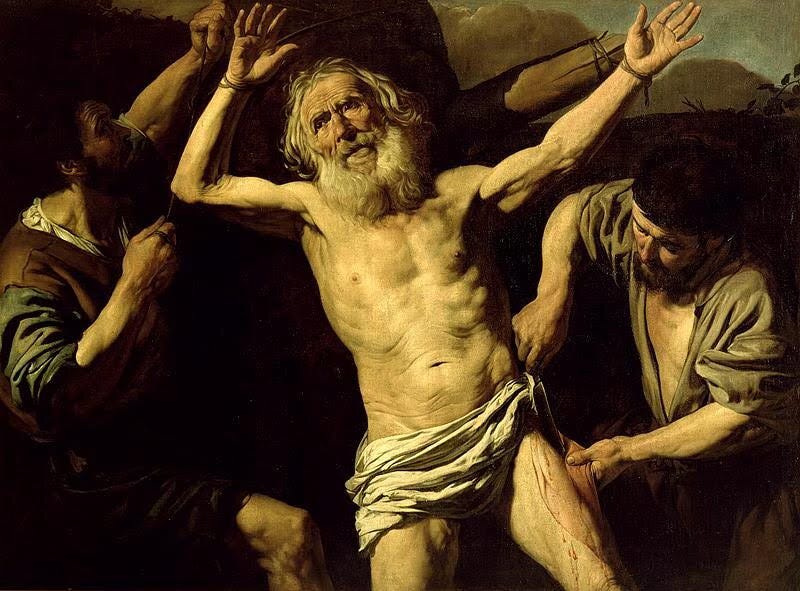Saint Bartholomew, Apostle and Martyr, also called “Nathanael” in St. John’s Gospel, is named among the twelve Apostles in the Synoptic Gospels and the Acts of the Apostles. Comparatively little is known of Bartholomew from the New Testament, as the only mentions of Bartholomew occur in lists of the Twelve Apostles. It is said in Acts 1:13 that Bartholomew, along with the other disciples, “with one accord were devoting themselves to prayer, together with the women and Mary the mother of Jesus, and his brothers.”
Eusebius of Caesarea writes in Ecclesiastical History that Bartholomew journeyed to India on a missionary tour, upon which it is said he left a copy of Matthew’s Gospel behind. He also served as a missionary in Mesopotamia and Parthia, and other accounts hold that he also journeyed to Lycaonia and Ethiopia. Some debate exists concerning whether or not Bartholomew actually travelled to modern-day India, as some claim the ‘India’ to which Eusebius refers is actually Ethiopia or Arabia.
Nevertheless, it is certain that Bartholomew travelled to Armenia, to which he, along with Saint Jude “Thaddeus,” brought Christianity in the first century. Because of their work in Armenia, both Bartholomew and Jude are considered patron saints of the Armenian Apostolic Church; additionally, according to tradition, Bartholomew is the second Catholicos-Patriarch of the Armenian Apostolic Church.
Various accounts concerning Bartholomew’s martyrdom exist, but it is traditionally said that he was flayed alive and beheaded for bringing the Gospel to Armenia and converting the king. As a result, the symbol of St. Bartholomew is typically a butcher’s/flaying knife, sometimes positioned in front of a Holy Bible.
While little is known about Bartholomew from Scripture, and even other traditional accounts, we know that he was selected by Christ to be an Apostle and spread Christianity throughout the world following His Ascension. For this reason alone Bartholomew, along with the other Apostles, Evangelists, Martyrs, and saints, deserve our admiration for their steadfast faith in Christ and willingness to suffer all, even death, for the evangelistic cause of spreading the Gospel with all people.
His life and painful martyrdom remind the Church that the world seeks our demise. The Church is perpetually persecuted for Christ’s name’s sake. We are reminded throughout the Church year that the Apostles were not selected by Christ to be glorified on account of their works or admired by the Church of all ages for their strength—though these are certainly things about which we must be grateful—but as living witnesses of the Gospel and its ability to raise up all who die on account of it.
Our Lord says in the twelfth chapter of St. John’s Gospel:
“Whoever loves his life loses it, and whoever hates his life in this world will keep it for eternal life. If anyone serves me, he must follow me; and where I am, there will my servant be also. If anyone serves me, the Father will honor him.”
John 12:25-26
As the Apostles have so faithfully demonstrated, the glory of this world is nothing compared to the innumerable riches set aside for God’s saints in His Kingdom. He alone is our Rock and Foundation, the One on whom our faith is founded. Must we face the sword or butcher’s knife, we do so with dignity, joy, and gladness. We face all persecution on account of Christ with gladness because He alone can deliver us from the evils and perils of this world. Wherever we go, to whomever we spread His glorious Word, may it be a reminder to us that as the Apostles all laid down their lives for the sake of Christ, we also must lay down our lives for the sake of Him who called us, with full assurance that He will raise us up on the Last Day and bring us to His side. In His name. Amen.



